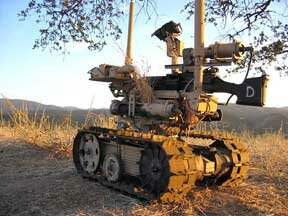Thu 2 Aug 2007

Stew Magnuson, National Defense Magazine, reports:
The U.S. Army quietly entered a new era earlier this summer when it sent the first armed ground robots into action in Iraq.
So far, the robot army’s entrance into the war has been a trickle rather than an invasion.
Only three of the special weapons observation remote reconnaissance direct action system (SWORDS) have been deployed so far.
The Army has authorized the purchase of 80 more robots — which are being touted as a potentially life-saving technology — but acquisition officials have not come forth with the funding.
“As [soldiers] use them and like them, I’ve heard positive feedback, they want 20 more immediately. It’s a shame we can’t get them to them,” Michael Zecca, SWORDS program manager, told National Defense.
The three robots, which tote M249 rifles and are remotely controlled by a soldier through a terminal, have been in Iraq since April and are with the 3rd Infantry Division, 3rd Brigade.
After three years of development at the Armament Research, Development and Engineering Center at Picatinny Arsenal, N.J., the robots were formally approved for combat use in June. Their exact whereabouts and missions are classified, but Zecca could confirm that they have been used in reconnaissance tasks and street patrols.
He did not know of any incidents of the weapon being fired so far.
SWORDS is designed to take on “high risk combat missions,” according to an Army statement. A specialist controlling the robot could send it into a potentially dangerous situation, such as a narrow street infested with snipers, seek targets and take them out before a foot patrol follows.
“Anytime you utilize technology to take a U.S. service member out of harm’s way, it is worth every penny,” said John Saitta, a consultant with Smart Business Advisory and Consulting and a major in the Marine Corps reserves, who has been trained as a weapons and tactic instructor.
“These armed robots can be used as a force multiplier to augment an already significant force in the battle space,” he added.
The 80 robots approved under an urgent materiel release, a mechanism designed to speed potentially life-saving technologies to the battlefield, are being held up “due to limited funding in fiscal years 2006-2007,” said Lt. Col. William Wiggins, a spokesman for the office of the assistant secretary of the Army for acquisition, logistics and technology.
“While SWORDS is currently not a program of record, the Army has initiated a memorandum of agreement between ARDEC and Robotic System-Joint Project Office to expedite establishing a funded program to meet Army needs,” Wiggins said in a written statement.
Additional details about the SWORDS program and the future of robots in the battlefield will appear in the September 2007 issue of National Defense Magazine.
Please email your comments to